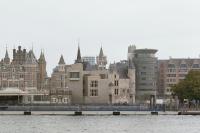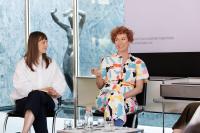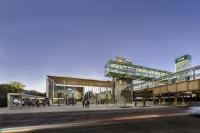Upcycling Pavilion
Mexico City, Mexiko
Expo CIHAC is the biggest annual architecture and construction exhibition in Latin America. Like many other exhibitions, it creates large-scale contamination due to the excess waste it generates. Almost all the pavilions of the different brands and products related to the architecture and construction industry, end up in the trash. Deeply concerned by this, we approached the exhibition principals with the proposal of creating a low cost - zero waste sustainable pavilion that could set an example for future exhibitions.
Inspired by the upcycling movement, that focuses on converting waste materials or useless products into new materials or products of better quality or for better environmental value, we conceived a pavilion made up exclusively of soda crates piled on top of each other. First, we presented the project to a major soda company, in this case Coca Cola, to get them to sponsor us and lend us the soda crates. Since they found the project very interesting and in tune with their sustainability company programs, they even offered to sponsor the transportation of the crates.
Second, we convinced the exhibition principals to let us build the exhibition´s cafeteria, which was never given any thought design wise, with 5,000 soda crates as an Upcycling Pavilion. Besides the aesthetic qualities and the environmental and sustainability virtues they saw in it, our biggest selling point was that it would not cost them a cent.
Since we´d never built a pavilion out of soda crates, we awaited the arrival of the 5,000 crates three days before the exhibition opened, and constructed it on the spot through on site experimentation and trial and error. The crates were piled on top of each other and simply tied to one another with small plastic cinch straps to create the walls. The curved walls are not gratuitous; they give structure and let you go up to 5 meters in height. The walls end in diagonal lines that meet the floor in order for them to have more stability.
Although upcylcing has been around for some time now, nothing of this sort had ever been done in the more than thirty years that the exhibition has taken place. It served as an example for unconventional and outside the box solutions for creating low cost and zero waste pavilions. When the exhibition came to an end, the pavilion was dismantled, the plastic cinch straps were collected and recycled and the soda crates were returned to Coca Cola to continue being used for what they were originally created: carrying soda pops.
Area: 300 m2
- Architekten
- BNKR Arquitectura
- Standort
- Expo CIHAC, Mexico City, Mexiko
- Jahr
- 2012
- In collaboration with
- Fermin Espinosa / Factor Eficiencia
- Project Leader
- Emelio Barjau
- Project Team
- Emelio Barjau, Sebastian Suarez, Marcell Ibarrola, Christian Morales, Montserrat Escobar & Jorge Alcantara
- Environmental Advisor
- Juan Casillas
- Sponsor
- Coca Cola / FEMSA














